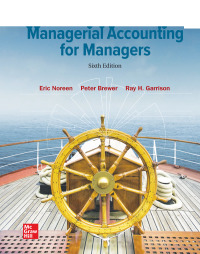Question
Please answer question 2, 2.1, 2.2 at bottom. Chester & Wayne is a regional food distribution company. Mr. Chester, CEO, has asked your assistance in
Please answer question 2, 2.1, 2.2 at bottom.
Chester & Wayne is a regional food distribution company. Mr. Chester, CEO, has asked your assistance in preparing cash-flow information for the last three months of this year. Selected accounts from an interim balance sheet dated September 30, have the following balances:
Cash Marketable securities Accounts receivable Inventories
$142,100 Accounts payable $354,155 200,000 Other payables 53,200
$1,012,500 150,388
Mr. Wayne, CFO, provides you with the following information based on experience and management policy. All sales are credit sales and are billed the last day of the month of sale. Customers paying within 10 days of the billing date may take a 2 percent cash discount. Forty percent of the sales is paid within the discount period in the month following billing. An additional 25 percent pays in the same month but does not receive the cash discount. Thirty percent is collected in the second month after billing; the remainder is uncollectible. Additional cash of $24,000 is expected in October from renting unused warehouse space.
Sixty percent of all purchases, selling and administrative expenses, and advertising expenses is paid in the month incurred. The remainder is paid in the following month. Ending inventory is set at 25 percent of the next month's budgeted cost of goods sold. The company's gross profit averages 30 percent of sales for the month. Selling and administrative expenses follow the formula of 5 percent of the current month's sales plus $75,000, which includes depreciation of $5,000. Advertising expenses are budgeted at 3 percent of sales.
Actual and budgeted sales information is as follows:
Actual:
August September
$750,000 787,500
Budgeted:
October November December January
$826,800 868,200 911,600 930,000
The company will acquire equipment costing $250,000 cash in November. Dividends of $45,000 will be paid in December.
The company would like to maintain a minimum cash balance at the end of each month of $120,000. Any excess amounts go first to repayment of short-term borrowings and then to investment in marketable securities. When cash is needed to reach the minimum balance, the company policy is to sell marketable securities before borrowing.
The company will acquire equipment costing $250,000 cash in November. Dividends of $45,000 will be paid in December.
The company would like to maintain a minimum cash balance at the end of each month of $120,000. Any excess amounts go first to repayment of short-term borrowings and then to investment in marketable securities. When cash is needed to reach the minimum balance, the company policy is to sell marketable securities before borrowing.
Questions (use of spreadsheet software is recommended):
-
October
November
December
Total
Cash Budget
Cash Collection
40% after 2% discount
308700
324106
340334
973140
25% without discount
196875
206700
217050
620625
30% in next month
225000
236250
206700
667950
Warehouse rent
24000
24000
Marketable Securities Sales
7351
192649
200000
Bank borrowing
29750
53393
83143
Total Collection
761926
989455
817477
2568858
Less payments
60% of purchases and other
429871
452875
470561
1353306
40% of purchases and other
354155
286580
301916
942652
Equipment
250000
250000
Dividends
45000
45000
Total payments
784026
989455
817477
2590958
Surplus/Deficits
(22,100)
0
0
(22,100)
Opening balance
142100
120000
120000
142100
Closing balance
120000
120000
120000
120000
-
Mr. Wayne thinks that the gross margin may shrink to 27.5 percent because of higher purchase prices. He is concerned about what impact this will have on borrowings. Comment.
- Mr. Chester thinks that "stock outs" occur too frequently and wants to see the impact of increasing inventory levels to 30 and 40 percent of next quarter's sales on their total investment. Comment on these changes.
- Mr. Wayne wants to discontinue the cash discount for prompt payment. He thinks that maybe collections of an additional 20 percent of sales will be delayed from the month of billing to the next month. Mr. Chester says "That's ridiculous! We should increase the discount to 3 percent. Twenty percent more would be collected in the current month to get the higher discount." Comment on the cash- flow impacts.
Step by Step Solution
There are 3 Steps involved in it
Step: 1

Get Instant Access to Expert-Tailored Solutions
See step-by-step solutions with expert insights and AI powered tools for academic success
Step: 2

Step: 3

Ace Your Homework with AI
Get the answers you need in no time with our AI-driven, step-by-step assistance
Get Started


